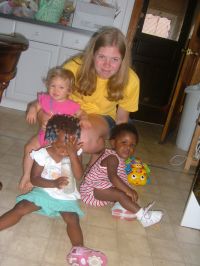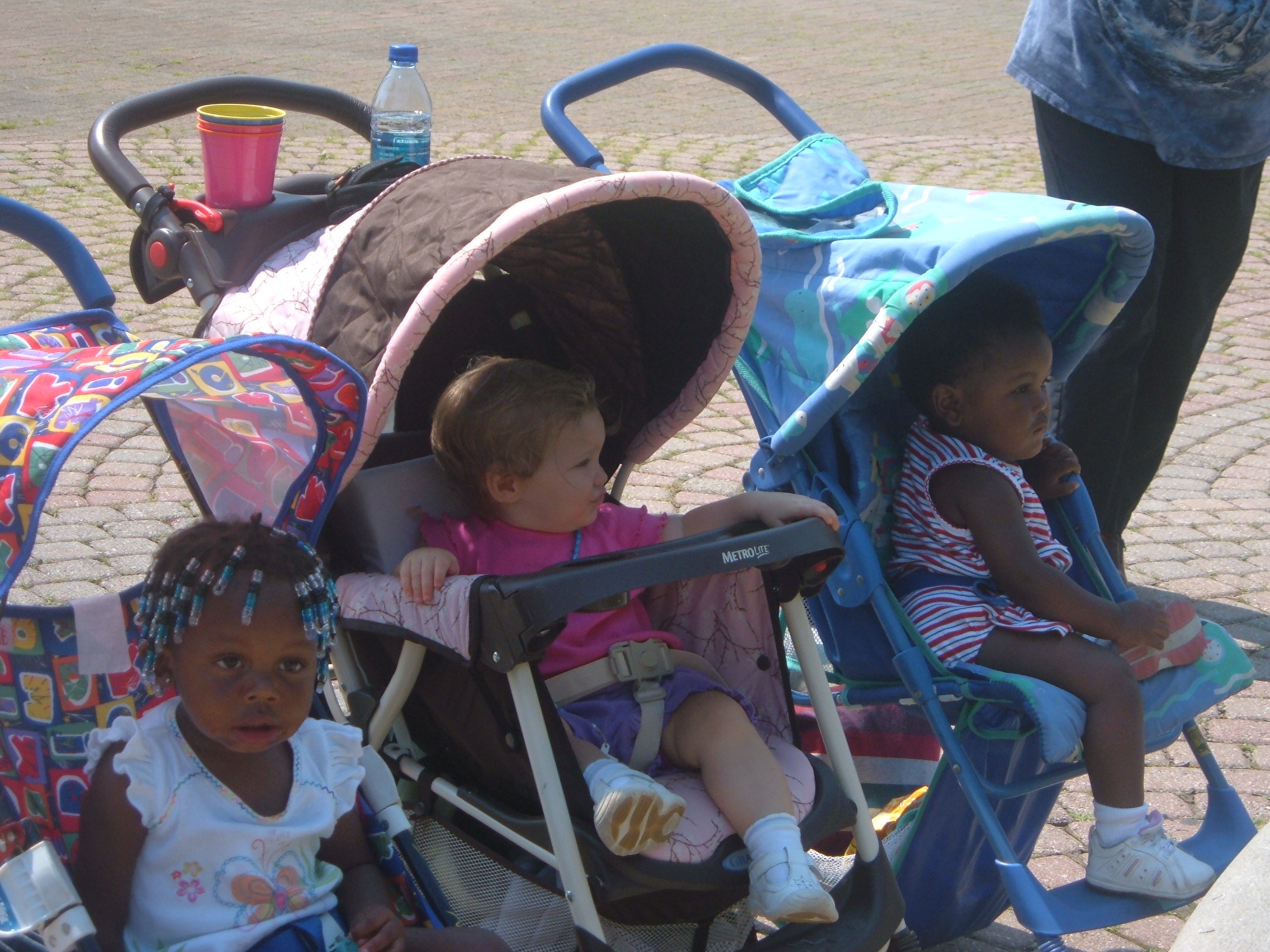BLITZ KRIEG PUBLISHING
Thinking About Adopting in Michigan? Here's the Process
by Donna Gundle-Krieg as published in Metro Parent Magazine
"If you are even remotely thinking of adoption, I would highly recommend that you just do it. A lot of children out there need you.”
Those words come from Marilyn Best, who had such an
incredible experience with adopting her own child that she became a family
mentor to support and assist others who are interested in adopting through
Commonwealth Adoptions International.
If adoption is such a positive experience and 4/10 or 81.5 million Americans have considered adopting, then why are so many children still without homes?
“Many people are nervous about the adoption process and costs,” said Raul Velez Velez, program director of Commonwealth Adoptions International. “Others may be afraid that the child they receive will not be a good match.”
However, that fear is unfounded. “You have to feel comfortable with the child, and you do have the right to turn down a referral,” according to Nancy Bortman, foster care coordinator and home study worker for Child and Parent Services.

“In 17 years, I have yet to meet anyone who regrets adopting.” she added. “There are also many organizations able to assist people through the process”
In addition, financial assistance is available when adopting children out of the foster care system.
This tax credit combined with the aid available means that “all these children need is a leap of faith and courage from adults with love to share,” according to the Dave Thomas Foundation for Adoption. Both Dave Thomas (deceased founder of Wendy’s) and Gerald Ford are among famous Americans who were adopted as older children.
The paperwork and costs are manageable and you have decided that it is a good time to start taking steps to lead you towards your goal of adopting a child. Where do you start?
The first steps towards adopting are described in more detail below. According to experts, they basically involve: 1) obtaining a “Family Assessment;” 2) deciding which type of adoption you want: domestic, international, or foster care; and 3) choosing an agency, an attorney and an adoption medical expert.
STEP ONE: FAMILY ASSESSMENT
The first step in most adoptions is a “Family Assessment,” which is also known as a home study. In Michigan, family assessments are conducted by a social worker within an adoption agency.
The family assessment includes an application, criminal background check, medical forms, personal references and several home visits.
The home visits provide an opportunity for the family to learn more about adoption, and to seriously consider their motivations and expectations for adopting. During the home visits, the social worker tries to understand what type of child might best fit within a family.
“You do not have to be married to adopt a child,” according to the University of Michigan Work/Life Resource Center. “Being a single parent is perfectly acceptable.”
During the family assessment, you will also be asked to provide an income statement. While you do not have to be wealthy to adopt, you must have adequate resources to provide for your family. You don't have to own your own home, either, as long as there is adequate bedroom space per child.
The family assessment process usually takes anywhere from three to six months. “The home study can be done before the agency is chosen,” Bortman explained. Often the home study helps prospective parents choose the type of adoption as well as try out the adoption agency.
The average cost of a family assessment varies from $750-$1500. There is usually no fee when you are adopting a "special needs" child, or a permanent court or state ward.
STEP TWO: DECIDING WHICH TYPE OF ADOPTION IS BEST FOR YOU
Before, during or after the family assessment, the big question must be answered: what kind of a child is a good match for you? The three main categories of adoptions are domestic, international and foster adoptions.
When deciding which is best for your family, you should consider many factors such as your age, your lifestyle, your family situation and your motivation for adoption.
Another consideration is cost. The average domestic adoption costs $12,000, while international adoptions cost $13,000-$20,000 plus travel expenses. These costs could be offset by the $10,000 adoption tax credit. For foster adoptions, the need is so high that costs are minimal and the incentives are plentiful.
OPTION A: FOSTER ADOPTION
Foster adoption is an excellent choice for many people, including older, experienced parents. Adopting foster children is virtually free and available for families or singles with low or moderate income. Adoption assistance programs may provide medical assistance, social services, cash benefits and payment of adoption expenses.
Many foster children have special needs. According to the University of Michigan, "special needs" does not necessarily mean the child has any handicaps but that they are harder to place than a healthy infant. Special needs children may be over age five, part of a sibling group, of minority heritage, or have emotional, mental, learning, or physical impairments.
The median age of a waiting child is 8 years old. 45% of these children are African American, 34% Caucasian and 12% Hispanic.
According to the National Adoption Attitudes Survey, there are 565,000 foster children in the nation with 131,000 of these children available for adoption. Only 17% of those available will find a family by the time they turn 18 and age out of the system. If only 1/500 Americans adopted out of foster care, all of these children could find homes.

OPTION B DOMESTIC ADOPTION
In Michigan, the "waiting for an infant list” currently runs between three and five years if you're interested in adopting a perfectly healthy Caucasian child under the age of one, according to the University of Michigan. Across the nation, there are 25,000 such infants available for adoption -- and one million families waiting for those infants.
Many domestic adoptions involve a selection process where birth parents have a say in who gets their baby. If a family is lucky enough to be selected early, then their wait would be shorter.
There are also people who shorten the average wait time by trying independent adoptions. These people want domestic infants so badly that they will work independent of an agency, and spend a lot of money on advertising and networking to try and find an infant. One should work closely with an attorney when adopting independently, as a significant number of these adoptions fall through when the birth mother changes her mind.
Another decision to make if you adopt domestically is whether you want to engage in an open adoption, which means that the birth and adoptive parents have met each other. At least half of the domestic agency placements of infants each year are open adoptions, and this trend is growing. There are still many agencies in Michigan who deal with closed adoptions. Usually an adoption is closed at the request of the birth parents.
OPTION C INTERNATIONAL ADOPTION
International adoption is on the rise, and appeals to people for many reasons. First of all, the option opens up another supply of healthy children, particularly infants. Second, many people like the idea of incorporating another culture into their household, particularly if they are able to adopt from a country of their own heritage.
Many countries participate in adopting infants through the United States. Velez Velez says his agency deals with children in Russia, Ukraine, India, Colombia, China and Viet Nam.
“Columbia has the best selection of healthy infants, with the average adoptee at age 7-10 weeks,” he said. “We work with a single mothers’ shelter where they receive excellent pre-natal care.”
He also said the agency is working hard to place sibling groups and older children from Russia and Columbia. “We host recreational trips for prospective adoptive parents to evaluate a child before making a final decision, without the child knowing,” he said. “If you will take older kids, the process takes only 3-4 months.”
International adoption tends to be more expensive, mainly due to the travel that is required. There is also a “dossier” required, which is additional paperwork. “A good international adoption organization will help you through the process,” says Velez Velez.
Another concern for those adopting internationally is the medical risk involved. However, agencies will supply or refer people to one of the many medical adoption doctors that are experienced in evaluating medical records before the adoption is complete.
Families that have adopted from other countries are usually very happy with their decision. They call the travel experiences exciting, and said that the adoption organization assisted them greatly during their visits abroad and during the process.
The need for international adoptive parents is huge. One parent described their visit to Russia’s baby house: “There were 100 babies who would all come up and look at you and call you mama and dada. We wanted to take them all home.”
STEP THREE: HIRE AN AGENCY
Which adoption agency should you choose? It depends on which type of adoption you wish to do, as well as your personal and religions preferences. Many of the agencies listed later in this article also provide pregnancy consultation as well as other services for both birth parents and adoptive parents.
Once you choose an agency, they will often help find you an attorney and medical expert. You can also find an attorney through www.adoptionattorneys.org.
START RESEARCHING NOW
General information on adoption can be found in many places.
The Annual Guide to Adoption is a valuable resource which includes a step by step overview of adoption process as well as helpful tips on laws, taxes, agencies, support groups, and attorneys. See www.adoptivefamilies.com or call 1-800-372-3300. Adoptive Families Magazine is published by the same organization.
Heart tugging pictures of special needs children who need homes is available at The Michigan Adoption Resource Exchange at www.mare.org
Should you decide to take the plunge, you will have lots of company. According to the U.S. Census Bureau, in 2000, 2.5 percent of children living with their parents in America were adopted into their families. This is a total of 1.6 million children under the age of 18 growing up adopted.
This data shows that “adoption in America is alive and well," says Thomas Atwood, president and CEO of National Council for Adoption.
While adoption may be alive and well, there is a continuing high need for caring individuals to become adoptive parents. Once you get on the websites and see the faces of the kids who are waiting, your life will never be the same.
ADOPTION RESOURCES
Adoption Associates (248) 474-0990 http://www.adoptassoc.com
Adoption Network (800) 367-2367 http://www.adoptionnetwork.com/
Americans for International Aid and Adoption http://www.aiaaadopt.org
Bethany Christian Services (248) 414-4080 http://www.bethany.org
Catholic Social Services of Oakland County (248) 333-3700 www.cssoc.org
Child & Parent Services, Inc. (800) 248-0106 www.childandparentservices.com
China Adoption Resources (604)785-6575 http://www.chinaadoptionresources.com
Dave Thomas Foundation for Adoption (800)275-3832 www.davethomasfoundation.org
Hands Across the Water (734) 477-0135 www.hatw.org
Jewish Family Service Alliance for Adoption (248) 559-0117 www.jfsdetroit.org
Lutheran Adoption Service (248) 423-2770 www.lcfsmi.org
Methodist Children's Home Society (313) 531-4060
Muslim Adoptions www.muslimadoption.com
Spaulding for Children for special needs
children (248) 443-7080
www.spaulding.org
Return to blitzkriegpublishing.com home page
Northern Michigan Shanty Creek/ Schuss Mountain Rental For Ski and Golf

Education Articles by Donna Gundle-Krieg
Blitzkriegpublishing home page